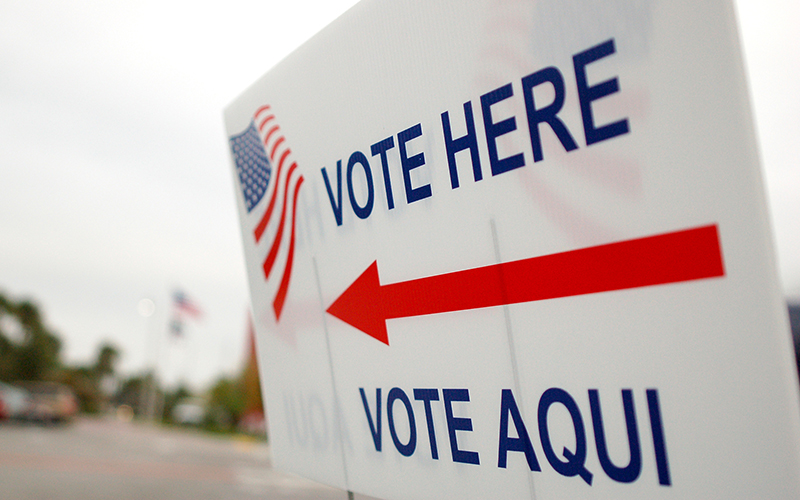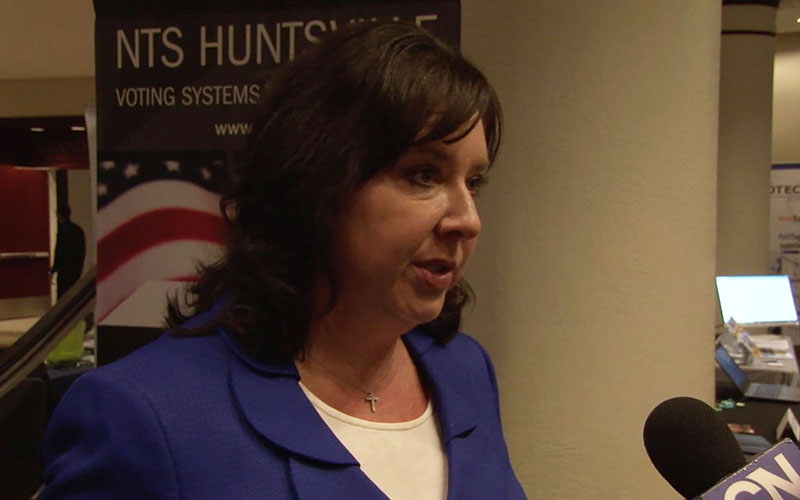
Arizona joined several other states that rebuffed, in whole or in part, requests from a White House elections panel for detailed voter information, including dates of birth, partial Social Security numbers and felony convictions, among other data. (Photo by Erik Hersman/Creative Commons)

Arizona Secretary of State Michele Reagan said she will send a presidential panel some of the information it is requesting on the state’s 3.6 million voters as it probes possible voting irregularities. But she will not turn over voters’ personal information. (Photo by Anthony Marroquin/Cronkite News)
WASHINGTON – Arizona will comply with only some of a request from the Presidential Advisory Commission on Election Integrity for personal information on the state’s 3.6 million registered voters, Secretary of State Michele Reagan said Friday.
She follows the lead of several other states that had refused the request, made of all 50 secretaries of state, for voters’ names, dates of birth, addresses, political affiliation, vote history, any felony records and the last four digits of Social Security numbers.
Reagan said Arizona will provide the commission any data that is publicly available but that other information – including Social Security numbers, birth dates and other personally identifying information – will not be released.
“Arizona voters can expect to have their personal information remain private and safe,” Reagan said in a statement posted by her office.
The letter was sent Thursday by Kansas Secretary of State Kris Kobach, vice chairman of the commission appointed by President Donald Trump, who has repeatedly claimed that as many as 5 million votes were cast illegally in the 2016 presidential election.
Democratic presidential nominee Hillary Clinton won 2.8 million more votes than Trump in that race, but still lost the presidency because Trump won the Electoral College vote by a solid 304-227.
Kobach’s letter asked secretaries of state for input on how they would improve election integrity as well as any evidence of voter fraud in their states.
Reagan, like most other secretaries of state, said after the president’s allegations of voter fraud that she was confident there was nothing nefarious in the 2016 results.
Most experts agree with the secretaries of state, saying there has been no evidence of voter fraud on the scale suggested by Trump. His May 11 executive order creating the commission makes no mention of fraud in the last election, but directs the commission to find ways to boost the “people’s confidence in the integrity of the voting processes used in federal elections.”
In his letter to the secretaries, Kobach said the commission is setting out to identify laws and policies that either enhance or undermine confidence in federal elections processes.
But some civil rights groups remain skeptical of the commission and believe it will push for voter suppression in the future. They are also wary of Kobach, who was called the “King of Voter Suppression” by the American Civil Liberties Union for his aggressive pursuit of voter fraud that he claims exists.
Federal courts have ruled that Kobach’s claim of voter fraud in Kansas was pure speculation and said his efforts amount to “mass denial” of voters. The ACLU charges that Kobach’s strict voter registration policies are little more than attempts at voter suppression.
Connecticut Secretary of State Denise Merrill, the president of the National Association of Secretaries of State, said Kobach has a “lengthy record of illegally disenfranchising eligible voters in Kansas.”
While she plans to submit the requested information for the sake of transparency, Merrill said she found it “very difficult” to have confidence in the commission, noting that courts have repudiated Kobach’s “methods on multiple occasions.”
The commission is asking for the data from states before its July 19 meeting. As of Friday afternoon, however, Kentucky, Massachusetts, Minnesota, California, New York and Virginia had said they will not comply with any request in the letter.
I can’t speak for the state, but if anyone wants records from Maricopa they’ll have submit a public records request and pay the fees.
— Adrian Fontes (@RecorderFontes) June 29, 2017
In Arizona, most of the requested information is publicly available, but there is a formal process for requesting records. Maricopa County Recorder Adrian Fontes said in a tweet Thursday that as far as he is concerned, if anyone wants records from his county they need to “submit a public records request and pay the fees.”
The state settled a lawsuit last week when it agreed to drop the cost of getting Arizona’s voter database from roughly $30,000 to about $500 for the whole state, according to the Arizona Republic.
Not all Democrats are soured on the commission’s mission, however.
New Hampshire Secretary of State Bill Gardner, a Democrat who has a seat on the presidential commission, told a local news station that he was impressed with Vice President Mike Pence’s call with members. The vice president is chairman of the panel.
Pence made it clear on that call he expected members to “search for the facts” and that there should be no preconceived notions of the level of fraud in federal elections, Gardner said. “He emphasized bipartisanship and working together.”